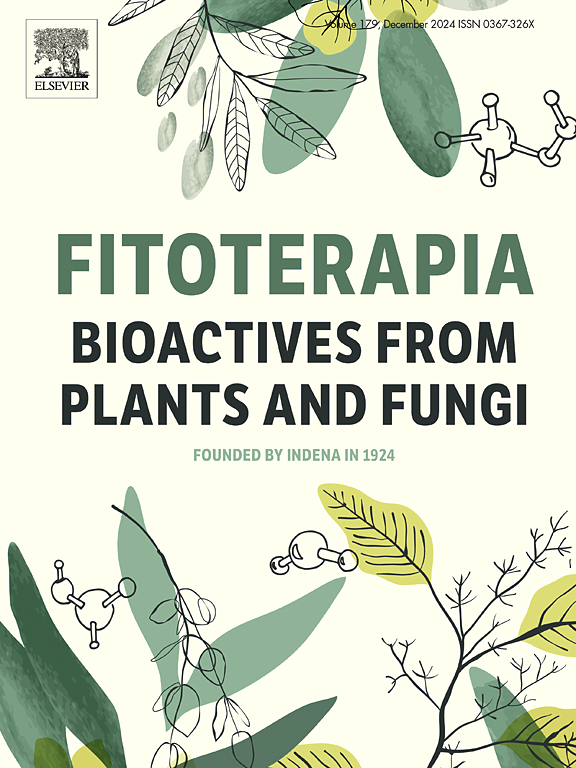网络药理学和代谢组学联合研究表明,芦花可通过BCAA降解途径改善运动性大鼠心肌损伤。
IF 2.6
3区 医学
Q3 CHEMISTRY, MEDICINAL
引用次数: 0
摘要
芦花是一种历史悠久、用途广泛的药用和食品相关产品。它具有抗炎和抗氧化的特性,并防止细胞凋亡。尽管越来越多的证据表明,过度运动(EE)可能会导致心脏损伤,但RCL已被证明具有保护心脏的作用。RCL对运动性心肌损伤的作用和机制尚不清楚。在这项研究中,我们用大鼠疲劳游泳模型来测试RCL提取物。采用PCR、ELISA、苏木精-伊红(H&E)染色、DHE染色等方法评价RCL对运动性心肌损伤的治疗效果。采用UPLC-Q-TOF-MS对RCL提取物及其血入口成分进行鉴定,构建网络药理学。LC-MS检测左心室代谢组学。为了预测RCL可能调节的代谢途径,将两者结合起来。最后,通过分子对接和western blot分析验证代谢途径的靶点。结果表明,红霉素B、4-羟基-2-碳杂蒽醌和9-氧基- 9h -4-氧杂蒽-羧酸可能是RCL的主要活性化合物。RCL促进支链氨基酸(BCAA),包括缬氨酸、亮氨酸和异亮氨酸的降解途径,调节BCAT2和BCKDK蛋白,减少病理损伤、炎症、氧化应激和胶原沉积,并通过影响关键靶点AKR1C1和代谢物l -缬氨酸减轻衰竭所致心肌损伤的影响。本研究为RCL作为一种运动补充剂,减轻ee引起的心肌损伤提供了基础。本文章由计算机程序翻译,如有差异,请以英文原文为准。

Combined network pharmacology and metabolomics reveal that Rubia cordifolia L. ameliorates exhaustive exercise-induced myocardial injury in rats via the BCAA degradation pathway
Rubia cordifolia L. (RCL) is a widely used medicinal with a long history. It exhibits anti-inflammatory and antioxidant properties and prevents apoptosis. While there is growing evidence that exhausted exercise (EE) might cause cardiac damage, RCL has been shown to provide cardioprotective effects. The effects and mechanisms of RCL on exercise-induced myocardial injury remain unclear. In this study, we tested the RCL extract using a rat model of exhausted swimming. We evaluated the therapeutic effect of RCL on exercise-induced myocardial damage using PCR, ELISA, hematoxylin-eosin (H&E) staining, DHE staining, and other methods. UPLC-Q-TOF-MS was employed to identify the components of the RCL extract and its blood-entry components, and network pharmacology was constructed. LC-MS was utilized to investigate left ventricular metabolomics. These two approaches were combined to predict the possible metabolic pathways regulated by RCL. Finally, the targets of the metabolic pathway were verified using molecular docking and western blot analysis. The findings suggest that rubioncolin B, 4-hydroxy-2-carbexyanthraquinone, and 9-Oxo-9H-xanthene-4-carboxylic acid may be the primary active compounds of RCL. RCL promotes the degradation pathway of branched-chain amino acids (BCAA), including valine, leucine, and isoleucine, regulates the proteins BCAT2 and BCKDK, reduces pathological injuries, inflammation, oxidative stress, and collagen deposition, and mitigates the effects of exhaustion-induced myocardial injuries by influencing the key target AKR1C1 and the metabolite L-Valine. This study provides a foundation for the development of RCL as a sports supplement to alleviate EE-induced myocardial injury.
求助全文
通过发布文献求助,成功后即可免费获取论文全文。
去求助
来源期刊

Fitoterapia
医学-药学
CiteScore
5.80
自引率
2.90%
发文量
198
审稿时长
1.5 months
期刊介绍:
Fitoterapia is a Journal dedicated to medicinal plants and to bioactive natural products of plant origin. It publishes original contributions in seven major areas:
1. Characterization of active ingredients of medicinal plants
2. Development of standardization method for bioactive plant extracts and natural products
3. Identification of bioactivity in plant extracts
4. Identification of targets and mechanism of activity of plant extracts
5. Production and genomic characterization of medicinal plants biomass
6. Chemistry and biochemistry of bioactive natural products of plant origin
7. Critical reviews of the historical, clinical and legal status of medicinal plants, and accounts on topical issues.
 求助内容:
求助内容: 应助结果提醒方式:
应助结果提醒方式:


